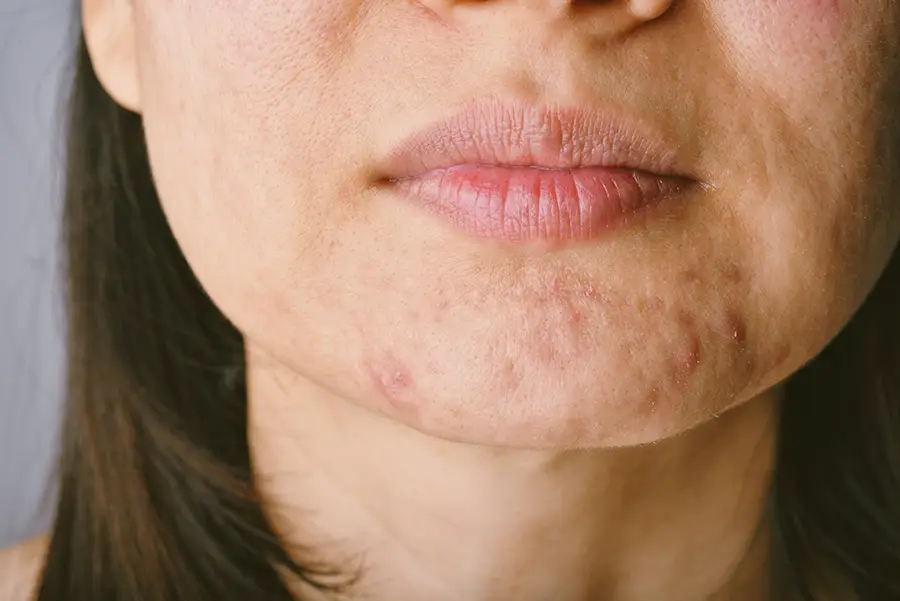Niacinamide’s growing popularity in skincare routines is no surprise—backed by science, niacinamide is praised for its ability to target various skin concerns without causing irritation, making it an essential for people with all skin types. Let’s explore how niacinamide works, why it’s effective, and the key benefits it provides for your skin.
What is Niacinamide?
Niacinamide is a water-soluble form of Vitamin B3 that plays a vital role in skin health by facilitating skin cell repair from environmental damage. It boosts skin resilience and enhances its natural barrier, making niacinamide a common critical ingredient in so many popular skincare products.
It’s important to distinguish niacinamide from nicotinic acid, another form of Vitamin B3. While both can benefit skin health, they function differently when applied topically. Nicotinic acid, though also used in skincare, is less commonly seen due to one key issue: it causes flushing by dilating blood vessels. This vasodilation effect can make the skin red and uncomfortable for some users. Niacinamide, however, delivers similar skin-repairing benefits without this unwanted side effect, making it a much gentler option for daily use.
Key Benefits of Niacinamide for Skin
Niacinamide offers a wide range of benefits for various skin concerns, making it a true multi-tasker. Here’s how it can transform your skin:
- Strengthens Skin Barrier: One of niacinamide’s standout features is its ability to improve your skin’s barrier function. It does this by increasing the production of ceramides, which are essential lipids that form a protective layer on the skin. A stronger skin barrier helps to lock in moisture, making the skin less vulnerable to environmental damage and dryness.
- Even Skin Tone: Niacinamide is highly effective at reducing hyperpigmentation and evening out skin tone. It works by inhibiting the transfer of melanin to skin cells, helping to lighten dark spots and reduce the appearance of age spots or sun damage.
- Reduces Fine Lines and Wrinkles: By promoting collagen production and supporting skin elasticity, niacinamide helps minimize the appearance of fine lines and wrinkles. It boosts the skin’s ability to retain moisture, which also leads to plumper, firmer skin over time.
- Calms Redness and Acne: Thanks to its anti-inflammatory properties, niacinamide is a great option for those with sensitive or acne-prone skin. It helps to calm redness and irritation while also regulating oil production, which can reduce the occurrence of breakouts.
- Regulates Oil Production: Niacinamide balances sebum (oil) production, which is especially beneficial for those with oily or combination skin. By helping to control excess oil, it can prevent clogged pores and the shine associated with overly oily skin, without stripping the skin of its natural moisture.
Comparing Niacinamide and Nicotinic Acid
Niacinamide and nicotinic acid are both forms of Vitamin B3, but they differ significantly in how they affect the skin.
Skin Flushing and Comfort:
- Niacinamide: Niacinamide does not cause flushing or any significant discomfort, making it ideal for daily use, even on sensitive skin. This is one of the reasons it’s so widely used in cosmetics.
- Nicotinic Acid: On the other hand, nicotinic acid causes vasodilation, which leads to skin flushing. This effect is temporary and not harmful, but it can be uncomfortable, especially for those with sensitive skin. As a result, nicotinic acid is less commonly used in topical skincare.
Suitability for Skin Types:
- Niacinamide: Whether you have oily, dry, or sensitive skin, niacinamide can work for you. It excels at hydrating the skin, and soothing irritation, making it a great all-around ingredient for various skin concerns.
- Nicotinic Acid: While nicotinic acid has therapeutic effects, its potential to cause flushing makes it less suitable for sensitive or reactive skin types. Niacinamide offers a more comfortable experience with similar skin health benefits, which is why it’s favored in modern skincare formulations.
How to Incorporate Niacinamide Into Your Skincare Routine
Niacinamide is a flexible ingredient that can be introduced at almost any step of your skincare routine. It’s available in various forms, including serums, moisturizers, and even toners, making it easy to find a product that suits your needs.
Start by applying a niacinamide serum after cleansing and before moisturizing, ideally in concentrations of 2% to 5%. It works well both in the morning and evening. Pair it with hydrating ingredients like hyaluronic acid for extra moisture, and always follow with sunscreen during the day to protect your skin from UV damage. Niacinamide is gentle enough for daily use, so you can gradually build it into your routine without worrying about irritation.
Best Skincare Products with Niacinamide
Whether you’re looking to brighten your complexion, reduce breakouts, or boost hydration, there are plenty of niacinamide-based products to choose from. Serums tend to be the most concentrated, targeting specific concerns like uneven skin tone or fine lines. Moisturizers with this ingredient offer all-day hydration while helping to improve your skin’s texture and resilience.
For acne-prone skin, formulas that combine niacinamide with soothing ingredients like zinc can help calm redness and reduce the appearance of blemishes. Meanwhile, if anti-aging is your focus, look for products that include niacinamide alongside peptides or collagen-boosting ingredients to maximize wrinkle reduction and improve elasticity.
Can You Use Niacinamide with Retinol?
Yes, niacinamide can be used alongside retinol, and they actually complement each other very well. Retinol, known for its powerful anti-aging and skin-renewing benefits, can sometimes cause irritation, dryness, and sensitivity, especially when first introduced into a skincare routine. Niacinamide, with its soothing and barrier-strengthening properties, helps mitigate these side effects.
For best results, apply niacinamide either before or after retinol, depending on your product type. Some skincare products even combine the two ingredients in a single formulation to simplify your routine.
Does Niacinamide Help with Acne Scars?
Niacinamide is best known for its ability to reduce post-inflammatory hyperpigmentation (PIH), which often appears as dark spots after acne clears. These marks are not true scars but are caused by an overproduction of melanin due to inflammation. By blocking melanin transfer to the skin’s surface, niacinamide can gradually fade PIH and even out skin tone. However, when it comes to true acne scars—such as depressed or raised scars caused by tissue loss or excess tissue—niacinamide has limited direct impact. While it may help improve skin texture over time by supporting collagen production and barrier repair, it is not a primary solution for treating deeper scars.
References:
AcneAdvocate is a participant in the Amazon affiliate advertising program and this post may contain affiliate links, which means we may earn a commission or fees if you make a purchase via those links.





